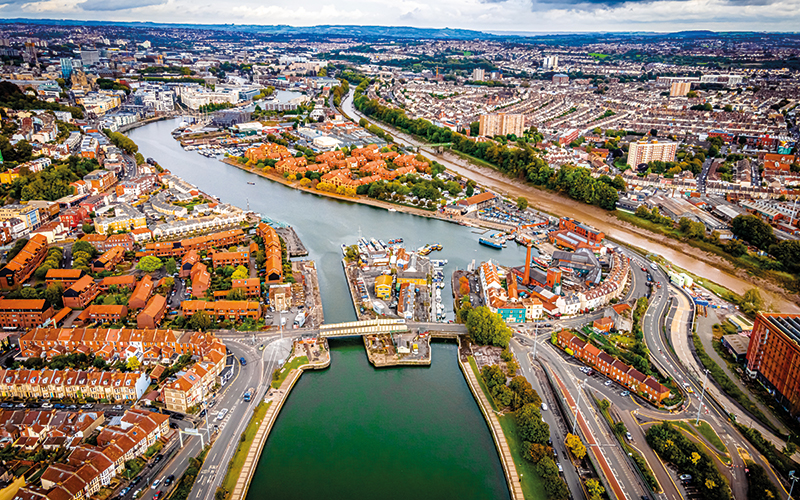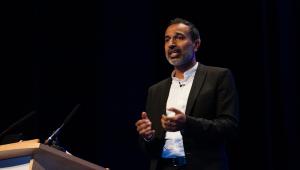
As wake-up calls go, the summer of 2023 will be remembered as a very big one.
The outpourings on social media following the wildfires in Hawaii showed that the world is finally waking up to climate change.
The warning from UN secretary-general António Guterres is stark: “The era of global warming has ended; the era of global boiling has arrived.”
There are other problems on the horizon. China’s drop in output has worried financial markets because of its impact on supply chains and consumer spending by the country’s wealthy. And food supplies are under pressure because of the war in Ukraine.
The world is still responding to the Covid-19 virus – as well as paying for the shutdown needed to limit its worst effects.
Government balance sheets also include the cash spent responding to the financial crash.
In the UK, the result is severe.
The OECD says: “Compared with other developed countries, the UK has a very unequal distribution of income, with a Gini coefficient of 0.351. The UK has one of the highest levels of income inequality in Europe, although it is less unequal than in the US.”
Reality check
In the latest PF podcast on financial resilience, former chief secretary to the Treasury Liam Byrne MP, who leads the all-party parliamentary group (APPG) on inclusive growth, explains how this happened.
“During the past 10 to 12 years since the financial crash, the trend rate of growth in our economy has fallen. Ultimately, that affects how much anybody walks home with in their wage packet.
“At the same time, there’s been the gigantic boom in the value of household wealth – not least, thanks to nearly £1trn of quantitative easing. The wealth-to-wages curve is completely different.”
The result?
“People just don’t have the financial wherewithal to buy assets like houses and pensions. The top 1% have got richer – it’s gone up about 31 times more than for anyone else,” he says.
And the impact hasn’t been equal across the country.
Byrne says: “If you look at the way wealth has grown in different parts of the country, you see these pronounced inequalities. If you are born in a particular part of Britain, then, statistically, your wealth is just not going to multiply as much as if you are born in another part of the country.”
“That’s a big shift, and we’ve got to think about how we change it.”
Counting the cost
There’s a human price being paid by the people living with the consequences.
The Centre for Social Justice concluded that the UK has Europe’s highest number of drug and alcohol addicts. It estimated that the cost of treatment alone is £36bn a year. According to the Mental Health Foundation, 3.1% of adults in England show signs of drug dependence – and four million people are living with mental health issues.
But Covid-19 also started a shift in attitude, with councils reporting increased concerns from people about their community.
Councils are ready to respond to the rise of hyper-local residents.
Cllr Shaun Davies, the Local Government Association’s new chair, says: “Everything we do is ultimately about the people we serve. We know everyone better than someone behind a desk in Whitehall.”
Politicians are now converted to versions of devolution, but are less keen on giving away financial power as well.
In August, both the Institute for Fiscal Studies and the chair of the House of Commons select committee on standards questioned how funding is being allocated to local areas by Whitehall departments.
Committee chair Chris Bryant argued that political bias was the deciding factor.
Others claim that the bigger issue is how to raise the funds needed more fairly through taxation.
Will Snell, chief executive of the Fairness Foundation, says: “You do need to ensure that those at the top are taxed more fairly and more effectively. That’s partly about tax avoidance.”
And when the funds get there? What if all the public services worked together to tackle problems that have multiple causes? Place-based budgeting is being discussed as a manifesto idea by the three main parties.
Sir Stephen Houghton, chair of the Special Interest Group of Municipal Authorities, tells PF: “Yes, I want the money to follow the services to help people. But I also want to get people out of poverty in the first place. And that’s about partnership working, place-based planning and regeneration.
“It’s also a 20-year strategy – not a few bob here and there.”
William Morris
The radical polymath written out of history
The blueprint for a sustainable Britain was sketched out by a visionary Victorian, who, today, is more famous for his wallpaper designs.
William Morris became an activist and environmentalist, who spent years developing natural dyes for his fabric designs. He also took to the streets and risked arrest to demand change.
Described by the V&A museum as “a polymath who spent much of his life fighting the consensus”, his vision of ‘romantic utopianism’ was of a world where ‘work-pleasure’ was expected for all. Factories were a source of evil and cities soul-destroying.
His book, News from Nowhere, written in 1890, explains: “It is the allowing of machines to be our masters and not our servants that so injures the beauty of life nowadays. And, again, that leads me to my last claim, which is that the material surroundings of my life should be pleasant, generous, and beautiful.”
He helped found the Society for the Protection of Ancient Buildings in 1877, and inspired Ebenezer Howard, creator of the garden cities movement.
Why was he forgotten? After his death, his family distanced themselves from his political work, setting the Morris ‘brand’ forever.
Sense of place
To build better places, housing is a good place to start.
Snell says: “We can’t make much progress without addressing housing. That lies at the root of so many problems in society. We’re never going to be able to close the [wealth] disparity without tackling it.”
But it’s not just about newbuild numbers. To tackle problems with mental health, crime, obesity and to meet net-zero demands, houses need to be homes in a community.
Professor John Bryson, chair in enterprise and economic geography at the University of Birmingham, says the planning system needs to change to achieve this. It’s as much about safeguarding heritage as allocating plots.
“There is an ongoing real threat to the identity of all UK villages, towns and cities, and this threat comes from the planning process and building regulations. The planning process would argue that it is sensitive to place, but this sensitivity fails to protect what can be labelled as the essence of a place.”
Housing was raised at the APPG inclusive growth conference in Westminster this summer, which PF supported. But another critical issue also got highlighted as needing a fix.
Paul Johnson, chief executive of the Institute for Fiscal Studies, says: “We’ve got to get education right. It’s what happens at the age of 16 if they aren’t going on to university. They’re left flailing with a not very high-quality set of choices.”
But communities need more than the basics to thrive.
The government may not like arts funding, but experts say that a cultural recovery from Covid-19 is vital. Reanimating public spaces is critical to getting people to re-engage with where they live – and each other.
Dr Jonathan Gross, lecturer in culture, media and creative industries at King’s College,
London, says: “In response to the huge challenges and losses of the pandemic, city policymakers experimented and innovated in how they support culture.
“These new possibilities for cultural policymaking have the potential to make key contributions to the ongoing process of developing more inclusive, sustainable, and democratic post-Covid urban futures.”
Profit and purpose
The economies of those urban areas are already shifting, with early adopters building versions of the circular economy.
The OECD explains: “A circular economy aims to reduce consumption of finite material resources by recovering materials from waste streams for recycling or reuse, using products for longer, and exploiting the potential of the sharing and services economy. Circular economy policies and initiatives largely take place domestically at the national or regional level. However, they have important interlinkages with international trade.”
Local manufacture also reduces labour abuses, as seen in the garment trade.
Where to start
If you’re looking for an outlier, go to Bristol.
The credentials: the city was named European Green Capital in 2015 and Most Sustainable City in 2008 by Forum for the Future. And the UK Infrastructure Bank is investing in its projects.
Why? Researchers rate renewable electricity sites, recycling rates, excellent university sustainability ratings, the number of charity shops and the fact that it’s been named as both an official Cycling City and Fair Trade City.
Go to: Green Bristol – visitbristol.co.uk

Shipshape and Bristol fashion: the city has won multiple accolades for its sustainability and green ethos
Direct action
Councils have taken the opportunity to get started on improving local jobs. The LGA, working with funding from the Department for Levelling Up, Housing & Communities, is launching a skills hubs programme targeted at the legal, environmental health, digital and ICT, finance and civil engineering sectors.
The LGA says: “The programme brings local authorities together to work collaboratively rather than on an individual basis and will assist councils with workforce planning.”
But is just making what we’ve always done ‘a bit better’ really going to be enough? A bigger rethink is needed, according to campaigners.
Johnson says: “We need a concerted effort. We need an education system that works, we need an early-years system that works, a housing system that works and a labour market that works better. And we need a tax and welfare system supporting that.”
Snell warns that a fundamental change in relationship between people and power must also happen.
“It does feel to me that the balance has shifted too much towards people seeing themselves as consumers, at the expense of thinking of themselves as citizens.”
People are focused on being individualistic rather than on “a societal framework in which they live”, he says.
Trussell Trust chief executive Emma Revie says knowing our society is broken isn’t enough: “Unless we can find a way to build a broad and deep consensus rather than pushing people apart, we won’t have the political or public will to make the changes we need to make.”
In a world of limited resources, political parties will have to stop promising to make voters richer.
As Snell says: “Fairness needs to be at the heart of every manifesto at the next general election.”



















